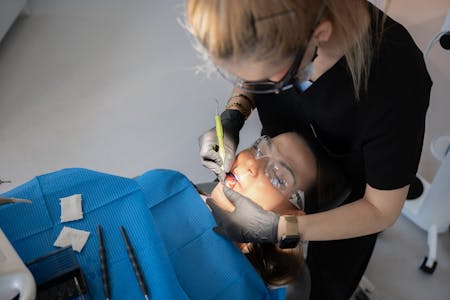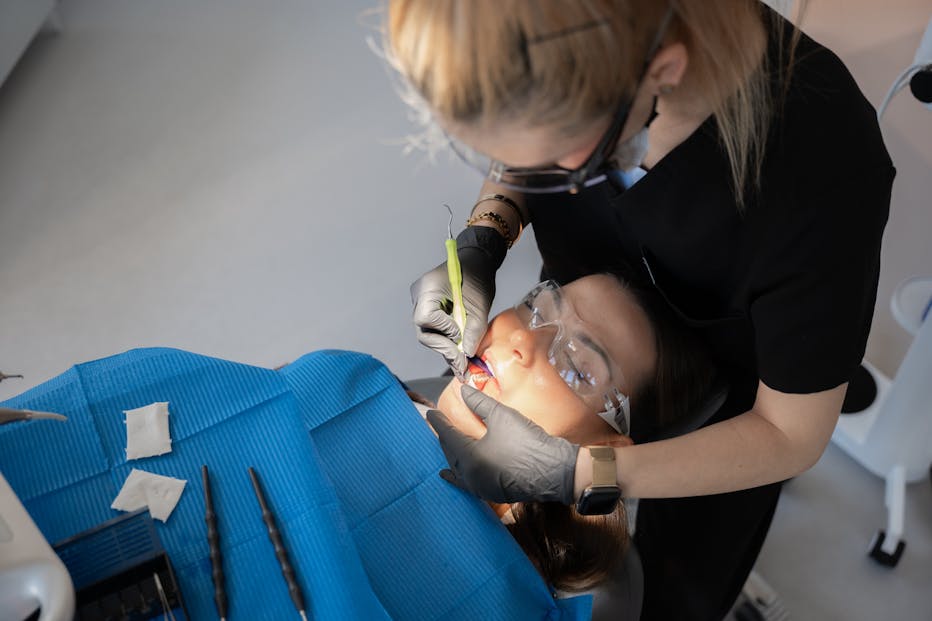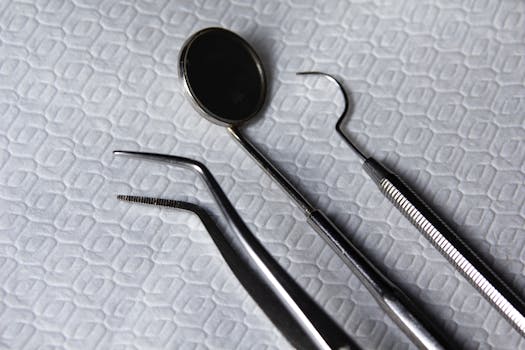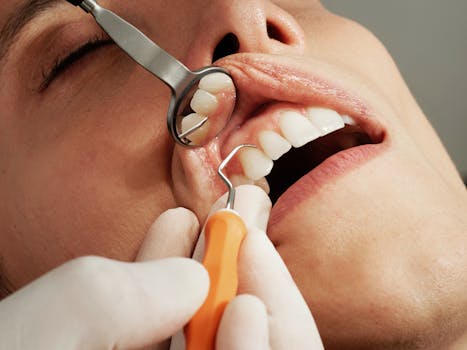Tips for the treatment of receding gums
A healthy smile is not only beautiful to look at, but also a sign of good oral health. However, many people suffer from gum recession, a condition that not only affects the appearance of the teeth, but can also lead to serious problems such as periodontitis, gingivitis and tooth loss. In this blog post, we want to share with you important tips about gum recession and its treatment options.



What is gum recession?
Gum recession is a common problem, often associated with serious gum disease such as periodontitis. Periodontitis is a serious inflammation of the gums that can have far-reaching consequences. It is not limited to the gums, but can also attack the underlying jawbone. This condition often leads to exposed tooth necks and roots, which causes several problems.
Not only are exposed tooth roots aesthetically problematic, but they also increase pain sensitivity, especially when in contact with hot or cold substances. In addition, exposed tooth roots are more prone to decay and erosion because the root area is not as hard and resistant as the enamel that covers the visible part of the tooth.
In some cases, gum recession can progress to the point of bleeding gums and swelling in the mouth. These symptoms are not only uncomfortable, but they can also further affect overall dental health and increase the risk of further complications.
It is therefore crucial to recognise early signs of gum recession and take appropriate action. At ALPINE WHITE, we offer comprehensive checkups to identify such problems early and develop effective treatment plans.
Causes of gum recession
The most common cause of receding gums is insufficient or poor oral hygiene. Bacteria collect in the affected areas and can cause inflammation of the gums. But other factors such as teeth grinding, incorrect brushing technique and malpositioned teeth can also play a role. Dentistry also examines the influence of the jawbone and the roots of the teeth on the condition of the gums. In the worst case, the recession of the gums can lead to tooth loss, which in turn leads to the need for tooth replacement such as implants or a dental crown.
Inadequate or poor oral hygiene
Probably the most common cause of gum recession is poor oral hygiene. If the teeth are not cleaned regularly and thoroughly, bacteria can accumulate in the gum pockets and at the roots of the teeth. These bacteria can cause inflammation of the gums, which accelerates gum recession.
Teeth grinding
Teeth grinding, often triggered by stress or bad habits, increases pressure on the gums and can contribute to their recession. This is an often overlooked factor, but one that can have a significant impact.
Incorrect plastering technique
Brushing too hard or using a hard toothbrush can damage the gums and cause them to recede. At ALPINE WHITE, we recommend soft or medium-hard toothbrushes for effective but gentle cleaning.
Tooth malpositions
Misaligned teeth can cause uneven distribution of pressure when chewing, which puts additional stress on the gums and can promote their recession.
Condition of the jaw bone and the roots of the teeth
Dentistry also studies the influence of the jawbone and the roots of the teeth on the condition of the gums. A weak or receding jawbone can reduce the support for the teeth and gums, which can accelerate the recession of the gums.
Effects of gum recession
In this section, we would like to take an in-depth look at the diverse and often underestimated effects of gum recession in order to provide a comprehensive understanding of the significance of this widespread oral health problem.
In the worst case: tooth loss
In the worst case, the recession of the gums can lead to tooth loss, which in turn requires the use of dental prostheses such as implants or a dental crown.
Periodontitis and gum recession
Periodontitis (periodontosis) is advanced gum inflammation and poses a serious threat to the health of your gums and teeth. Unlike simple gingivitis, which is usually reversible, periodontitis causes even more gum recession and is often irreversible.
One of the most serious consequences of periodontal disease is the impairment of the jaw bone. The bone can recede, weakening the hold of the teeth in the mouth. This can lead to recession in the gums, where the gums pull back from the teeth and expose the roots of the teeth.
The symptoms of periodontal disease can be varied, ranging from bad breath to swollen and bleeding gums. Bad breath is often one of the first signs and should not be ignored as it can indicate excessive bacteria build-up in the mouth. Swollen and bleeding gums are other serious symptoms that require immediate attention.
Due to the irreversible nature of periodontitis, early diagnosis and treatment is crucial. At ALPINE WHITE, we offer comprehensive Oral Health Checkups to detect such serious gum problems early. Our specially trained dental hygienists can develop an individualised treatment plan to slow the progression of the disease and maintain dental health.
How to protect your gums
Brushing teeth
Proper technique when brushing your teeth is not only crucial, it is also the foundation for long-lasting dental health. An electric toothbrush is usually more effective than a manual toothbrush. But it's not just the brush that's important, the toothpaste also plays a big role. Our Whitening Toothpaste is available in three versions: Extra White, Anti Plaque and Sensitivity Relief. Each is specially formulated to meet your individual needs, whether it's for bright white teeth, plaque reduction or tooth sensitivity relief.
Dental floss and mouthwash
Dental floss is an indispensable tool for removing tartar and bacteria from between the teeth. It not only helps prevent tooth decay, but also gum inflammation and periodontitis. At ALPINE WHITE, we also offer antiseptic mouthwashes that are specially formulated to reduce gingivitis and disinfect the entire mouth. These products perfectly complement our Whitening Toothpaste and provide comprehensive protection for your gums and teeth.
Professional teeth cleaning
Regular professional dental cleaning is essential to effectively remove gum pockets, caries and tartar. At our Swiss Studios, we offer dental hygiene and oral health checkups, among other services, performed by qualified dental hygienists. These services are designed to thoroughly check your dental health and detect any potential problems at an early stage. Professional teeth cleaning is particularly effective in removing stubborn tartar and plaque that you cannot reach with daily oral care at home.
Treatment options
Gum reconstruction and grafts
If you suffer from severe gum recession, a surgical procedure such as a gum graft may be necessary in some cases. In this procedure, healthy gums are taken from elsewhere in the mouth and attached to the affected areas. This helps to rebuild the gums and protects the exposed tooth roots from further damage. It is an effective way to restore the aesthetics and function of the gums. At ALPINE WHITE we can refer you to specialist dentists who offer this type of treatment.
Implants and dentures
If the periodontium, i.e. the system of gums, jawbone and tooth roots, is severely damaged, dental implants can be a good option. These artificial tooth roots are inserted directly into the jawbone and provide a stable base for crowns, bridges or dentures. They are a permanent and aesthetically pleasing solution to tooth loss. In our Swiss Studios we offer Oral Health Checkups, where we can assess the condition of your periodontium and refer you to specialists for implants if needed.
Home remedy
There are also a number of home remedies that can help with mild gum problems. Oil pulling is an ancient Ayurvedic method that involves swishing a tablespoon of oil (usually coconut or sesame oil) back and forth in the mouth to bind and rinse out bacteria and toxins. Special teas such as chamomile or sage tea can also help to reduce inflammation and soothe the gums. These methods can be a useful addition to our ALPINE WHITE products such as Whitening Toothpaste in Extra White, Anti Plaque and Sensitivity Relief versions.
Prevention is better than cure
Avoid hard toothbrushes
Choosing the right toothbrush is crucial for the health of your gums and can even prevent gum disease. Hard toothbrushes can further irritate the gums, which can lead to inflammation and even recession of the gums. This in turn can result in exposed tooth roots and swollen gums. At ALPINE WHITE, we therefore recommend the use of soft or medium-hard toothbrushes. Our Toothbrush is designed to provide a thorough but gentle clean.
Watch your diet
A balanced diet is not only important for your overall health, but also crucial for preventing gum disease. Nutrients such as vitamin C, vitamin D and calcium are essential for strengthening gums and teeth. Sugary foods and drinks should be avoided as they promote plaque formation, which can lead to tooth decay and gum problems. If you wear braces, careful oral hygiene is especially important, and our special toothpaste can be a big help.
Additional services at ALPINE WHITE
In our Swiss studios, we offer various check-ups in which we thoroughly examine the condition of your gums and teeth. These checkups are especially important to detect early signs of gum disease or problems with exposed roots. Our specially trained dental hygienists can give you comprehensive advice and recommend the best products and services for your individual needs.



